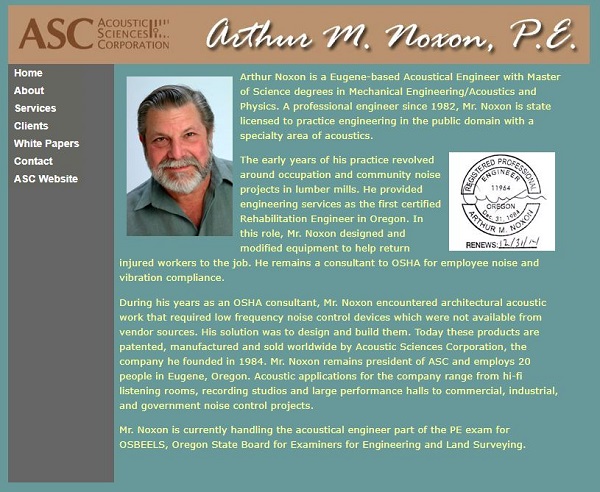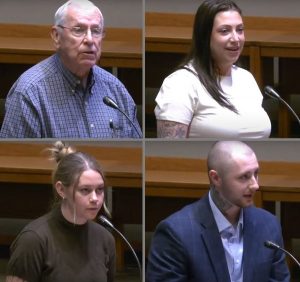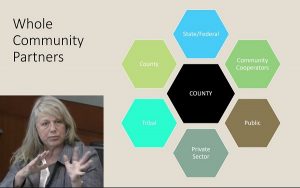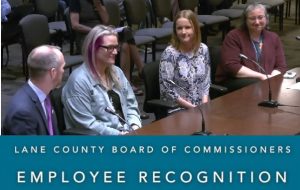City Council is unanimous: ‘Let our people sleep’
9 min read
The state again fails on enforcement, and the city of Eugene will now bear the cost. The council adopted parts of Oregon’s noise ordinance applying to the low-frequency sound waves coming from Zip-O-Laminators. Residents in the path of Zip-O’s industrial planer say it has been waking them up for years. On Jan. 23:
[00:00:21] Assistant City Manager Kristie Hammitt: The city received numerous complaints over the last few years regarding the low-frequency vibrations, but our current noise ordinance doesn’t address this type of noise.
[00:00:30] At a May 22, 2022 work session, council directed staff to draft an ordinance to address this noise and return in the fall for a public hearing.
[00:00:40] A public hearing was held on Nov. 21, at which 14 people spoke, 13 in favor of the ordinance. Tonight we are requesting that council take action on the proposed ordinance.
[00:00:49] John Q: More public comments Jan. 23, introduced by the city’s Cherish Bradshaw:
[00:00:54] Cherish Bradshaw (City of Eugene): Next we’ll hear from Sheree Miller.
[00:00:57] Sheree Miller: I just want to support the issues going around here between River Road and (Highway) 99 with the Zip-O-(Laminator) plant and the noise that we are waking up to every morning at four o’clock in the morning.
[00:01:09] I have eight kids. Most of them are foster kids and obviously have some issues. Without the sleep that they require—without the sleep I require—growing these kids into productive adults is not easy. And this gray noise that you can put your hand on my wall and it feels as if the noise is going through you.
[00:01:32] We’ve had multiple studies done to show the effect that this noise has on ourselves and our neighborhood. And I’d like you to consider more than just decibels, but frequency of noises that are keeping people up.
[00:01:45] I know many of you have received emails from many of us, and I just need for you to hear how this has impacted our lives and we are unable to actually send our kids to school many days because they have not gotten the sleep that they need.
[00:02:00] Cherish Bradshaw (City of Eugene): Next we’ll hear from Angela Englert.
[00:02:03] Angela Englert: Hi. My name is Angela. I’ve lived in this area for more than 40 years. For many years and several terms of different Eugene mayors, I’ve wondered when the city of Eugene expressed here would become brave and step up to require that businesses begin to behave in balance with the economics, the environment, the community, and the people, including them. May I be so bold as to say today is that day.
[00:02:27] I’m speaking in support of the noise ordinance. I’m tired of waking up in the neighborhood of 3:45 a.m. And I now wake up several times in anxious anticipation of the noise hitting my ears. I only get back to sleep part of the time. I am suffering with an ear infection from the earplugs that I have to use every, every time it happens, I am starting to have headaches and the vertigo that I’ve had my whole life is getting worse.
[00:02:53] It deserves to be said that this level of noise is unacceptable. No matter what time of day, it makes it impossible to be in my house. Even if I’m awake, I have to leave. And I want to say that we all deserve quality of life and a positive environment.
[00:03:08] Cherish Bradshaw (City of Eugene): Next we’ll hear from Angelique Orman.
[00:03:10] Angelique Orman: I’m here because I’m being terrorized by low-frequency noise from the Zip-O Mills planer. There are many studies on the negative effects of low-frequency sound, and I’d like to just list a quick list of the proven health effects associated with low-frequency sound:
[00:03:26] Reduced sleep quality, sleep disorders, discomfort sensitivity, irritability, annoyance, stress, nausea, headaches, reduced performance fatigue, anxiety, depression, dental wear, hearing loss, decrease in mental performance, increase in blood pressure, general mental indisposition, reduced work capacity, lack of concentration, tension, cognitive alterations, nervousness, negative mood, dizziness;
[00:03:56] Frequency of chromosomal aberrations in bone marrow cells, peptic ulcers, effect on the cerebral blood barrier, irreversible imbalance and structural damage to the otoconial membrane, tinnitus, hypertension, negative effects in the variation in heart rate and variation in heart rate, increased risk of myocardial infarction. and stroke.
[00:04:20] Exposure to low-frequency noise causes sleep disturbances, which adds to the demand for sleeping pills and antidepressants. A study on exposure to low-frequency sounds during pregnancy found that exposure to this type of noise is associated with the risk of increased hearing impairment in children.
[00:04:40] This problem affects people young and old from all walks of life. You do not have to be awake or aware that you are suffering from the side effects of low-frequency sounds. You don’t even have to be born yet. I am sure that many of my neighbors have had declines in health over the past two and a half years without even realizing the correlation.
[00:05:01] We cannot allow the profit margin of one company to trump the health and wellbeing of thousands of citizens. I am begging you to vote yes on the noise ordinance.
[00:05:11] Cherish Bradshaw (City of Eugene): Next we’ll hear from Laura Shoe.
[00:05:13] Laura Shoe: I’m Laura Shoe. Two and a half years ago, a single small company two miles away from me decided on their own to convert a quiet residential area—that a year before cost me hundreds of thousands of dollars to buy into—into a loud industrial area.
[00:05:31] Almost every weekday morning, they wake up many of my neighbors at 3:45 a.m. As I sit trying to relax and drink my coffee in the morning as I try to work in my home office, which I am finding impossible, the deep vibrational humming noise drills into my brain and makes me nauseous. At least hundreds of people have been negatively impacted by this.
[00:05:54] I beg you to not allow Zip-O-Laminators or some future company to get away with single-handedly degrading the character of our neighborhoods, reducing the value of our homes, and harming our health and safety.
[00:06:09] Cherish Bradshaw (City of Eugene): Next we’ll hear from Dharmika Henshel.
[00:06:12] Dharmika Henshel: I’ve been waking up for hundreds of nights in the last two and a half to three years from this poorly situated industrial planer. It’s set in a gap in a large metal wall. I believe the whole wall vibrates and somehow. It travels two miles away and continues to wake people up.
[00:06:33] The door to the planer shed is still open. I don’t know why it travels so far, but here we are.
[00:06:38] This specific low-frequency sound is in a narrow band that should have been regulated by the state but the state noise standards dropped their enforcement in the early nineties. So here we are and although Zip-O-Laminators said they’d be moving the planer at the end of 2021 and then May of 2022, and it’s just not really happened yet.
[00:06:56] So I’m really grateful that the city council is hopefully finally rectifying this situation. I request a yes vote on the city’s version of the state’s DEQ octave bandwidth measurement standards. I request a vote as an emergency measure since we’ve suffered long enough. And I also request the city council encourage the noise compliance officer (assuming this passes) to expedite the rest of the process towards compliance as quickly as possible.
[00:07:23] I know the city doesn’t have the means to make these measurements, but there are experts in the community that could do this, and I don’t know how long the process will take towards compliance, but I’m really looking forward to it.
[00:07:37] Eugene Building and Permit Services Director Lydia Bishop: We commissioned with Art Noxon, who’s a well-known sound engineer. He’s the engineer who actually did the report for the neighborhood that Dharmika (Henshel) referenced, and he pointed us at, as, I think, has been mentioned by some of the speakers to the state noise ordinance, which has language that regulates this type of noise, but doesn’t have the ability to continue to enforce it.
[00:08:03] So we adopted those portions of the state ordinance that are specific to this type of low-frequency noise. We worked with Mr. Noxon to make sure that it would address what the complainants are experiencing.
[00:08:16] We do intend to contract with a sound engineer. We actually could hire Art Noxon and there’s another one in town. So we have two viable people and we could contract with them right away.
[00:08:27] So once they’ve confirmed that there’s a violation, we send an order to correct. Often we allow for 30 days for a correction, but because this has been in effect for such a long period of time and because Zip-O is aware of the complaints and the action the council is taking. We would try and truncate that notice to correct.
[00:08:47] If they don’t respond to that, then usually what happens is we begin daily fines. And that often will get the attention of a business.
[00:08:57] Councilor Mike Clark: I think our community has a lot of work to do with the integration point, especially in West and Northwest Eugene, the integration point of industrial based lands and residential based lands. I think with J. H. Baxter, with this problem with noise, with several other potential issues that still exist, we need to have a good and thorough conversation about who’s responsible for what.
[00:09:22] In most cases, I would say if the plant was there first and homes were built after, that would require a more robust conversation about whose responsibility what is. But in this case, this is hurting people. Zip-O has had years to try and work that out with the people who live there near them. It’s been a point of conflict for a long time, and I don’t see the good faith that I would want to see in order to give them the benefit of the doubt.
[00:09:56] Councilor Alan Zelenka: I agree that we do have a problem with that interface and we need to think about it. In this instance, and in future instances, sometimes it’s going to be irrelevant who was there first because somebody changed something. Like in this case, they added these things later after everything was already built up and been there for years and years and years. So, it is harming people, their sleep and their health. It is a loophole that was created when the state stopped enforcing their code. And so this fixes that loophole.
[00:10:31] Councilor Lyndsie Leech: I move to amend the ordinance to add a new section four, declaring an emergency caused by persistent and unregulated vibrations and low-frequency sounds, and providing for an immediate effective date with the affirmative vote of two-thirds of the members of the city council.
[00:10:47] Typically after an ordinance is passed, they have 30 days to get that put in to effect. And so, due to the severe impact that this noise and vibration is having on hundreds of our citizens and my Ward 7 neighbors, it’s affecting their sleep and their health, and because of the lengthy timeline that they’ve had to live through this to get to this vote today, I don’t want them to have to wait any longer. I am suggesting that we make that immediate.
[00:11:16] And to say this is an emergency measure really gives a message to them, but also to other industrial noise and polluters that we are going to take this seriously, that you can’t just affect the lives of all of these people and not have consequences. So for that reason, I support the emergency measure.
[00:11:40] Councilor Emily Semple: This has been going on a long time and we get emails every day that people are writing at 4:15 (a.m.) Gee, I wonder why they’re writing us at 4:15 a.m.? It’s because they can’t sleep and they haven’t been sleeping for a long, long time.
[00:11:57] I think in this case, we do need to say: ‘It’s an emergency. Shut up and let our people sleep.’
[00:12:05] John Q: Council unanimously updates the city’s noise ordinance. Officials say they hope to stop low-frequency vibrations from Zip-O-Laminators’ industrial planer.



